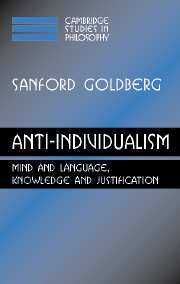Book contents
- Frontmatter
- Contents
- Preface
- Introduction
- Part I SEMANTIC ANTI-INDIVIDUALISM
- 1 The nature of knowledge communication
- 2 Public linguistic norms: the case from successful communication
- 3 Public linguistic norms: the case from misunderstanding
- 4 From public linguistic norms to anti-individualism regarding language and thought
- Part II EPISTEMIC ANTI-INDIVIDUALISM
- References
- Index
1 - The nature of knowledge communication
Published online by Cambridge University Press: 22 September 2009
- Frontmatter
- Contents
- Preface
- Introduction
- Part I SEMANTIC ANTI-INDIVIDUALISM
- 1 The nature of knowledge communication
- 2 Public linguistic norms: the case from successful communication
- 3 Public linguistic norms: the case from misunderstanding
- 4 From public linguistic norms to anti-individualism regarding language and thought
- Part II EPISTEMIC ANTI-INDIVIDUALISM
- References
- Index
Summary
INTRODUCTION
There can be little doubt that we acquire a good deal of our knowledge through the written or spoken word. Our knowledge of geography, science, and history; of current events; and even of our own names, parents, and birthdays – all of this (and more besides) involves knowledge we have acquired through accepting what others have told us. Without such knowledge we would be much less well-off, epistemically speaking, than we actually are.
While the existence of such knowledge is uncontroversial, its nature is not. There are debates regarding various related topics: whether another's say-so amounts to a kind of evidence (and if so, what kind); whether the justification or entitlement for accepting say-so derives from one's positive reasons for thinking that the say-so is credible; whether justification is even necessary for this sort of knowledge; whether the knowledge we acquire in this way is an epistemically basic sort of knowledge (and if so, in what sense); whether knowledge can be merely transmitted through testimony, or whether there can be cases in which a speaker generates knowledge for her hearer that she herself lacks; and how this sort of knowledge compares to other kinds of knowledge – in particular, perceptual or memorial knowledge.
I will have much to say on most of these topics, but for the most part I will reserve my own positive views on them for Part II of this book. Here, in Part I, I propose to remain as neutral as I can on these topics.
- Type
- Chapter
- Information
- Anti-IndividualismMind and Language, Knowledge and Justification, pp. 11 - 35Publisher: Cambridge University PressPrint publication year: 2007



